22 January 2016
Here are the spellings for this week:
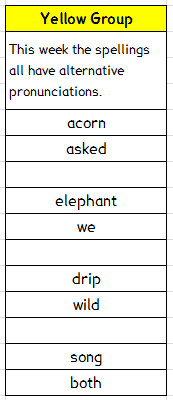
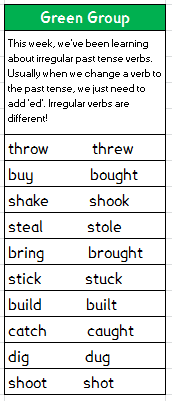
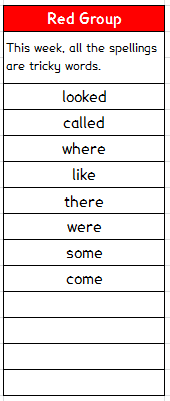
15 January 2016
This week’s spelling are all homophones. Homophones are words that sound the same but have different meanings and spellings e.g. new and knew. I’ve included some rough definitions as a guide. You might want to chat about other meanings with your child. For example, the word brake could be used as a noun (the brake of a car) and as a verb (I’m driving too fast so I’m going to brake).
| accept: to agree to receive something except: not including |
| affect: this has changed something effect: this will change something |
| not: changes the meaning to negative knot: usually string or rope tangled together |
| berry: a round juicy fruit bury: to put or hide underground |
| break: to damage something brake: something that stops a car or bike |
15 January 2016
Here are the spellings for this week:
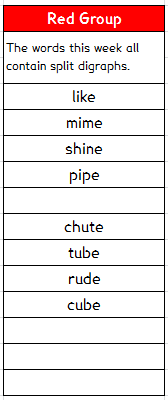
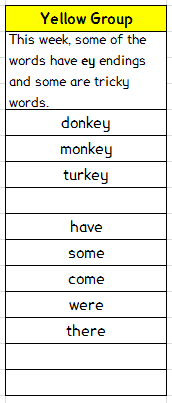
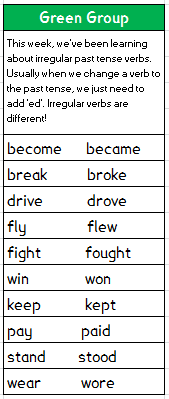
15 January 2016
This week’s spellings are homophones therefore they need to be practised within a sentence in order for the correct choice to be made.
precede – proceed
- C precedes D in the alphabet.
- “Please proceed with your class assembly, Y5,” said Mr Roundtree.
principal – principle
- The principal part of the Solar System is the sun.
- You need to have good principles.
profit – prophet
- A business needs to make a profit to succeed.
- A prophet said I would win the lottery.
stationary – stationery
- Remain stationary when a wasp comes near you.
- We use use lots of stationery in school: pencils, pens, rulers and sharpeners.
where – wear – were
- Where is the nearest supermarket?
- I like to wear warm clothing in Winter.
- We were enjoying learning about different materials.
there – their – they’re
- There’s a pink elephant over there!
- They went to get their lunch boxes.
- They’re going to Leeds City Museum very soon.
are – our – hour
- We are looking forward to moving on to learning out ‘Life’.
- Our favourite topic so far has been ‘Mission to Space’.
- A lesson usually lasts about 1 hour.
wait – weight
- Wait here while I hide.
- It’s good to be a healthy weight.
would – wood
- Would you like to come and have a picnic?
- Let’s go to the woods and have a picnic.
allowed – aloud
- I’m allowed to stay up later at a weekend.
- Sometimes it’s helpful to read things aloud.
08 January 2016 – Green Group
This week’s spellings for the Green Group:
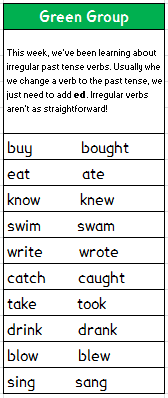
08 January 2016 – Red Group
Here are the Red Group’s spellings for this week:
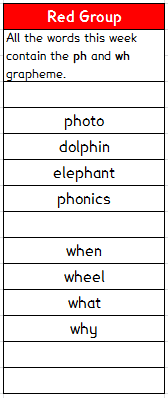
08 January 2016 – Yellow Group
Here are the spellings for yellow group this week.
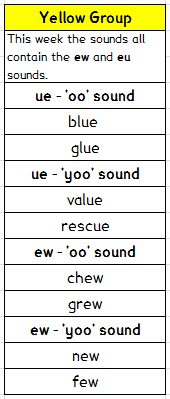
08 January 2016
The spellings this week follow a similar pattern, involving changing a t to a c.
| innocent – innocence |
| decent – decency |
| frequent – frequency |
| confident – confidence – confidential |
| observant – observance – observation |
| expectant – expectance – expectancy |
| tolerant – tolerance – toleration |
| substance – substantial |
These spellings will be practised throughout the week before being tested on Friday 15 January.
It’s Christmas…
There are no homework tasks or spellings during the holiday period.
Instead, support your child in other ways. Make sure they take part in family events, encourage them to relax and catch up on some reading at home, encourage them to send thank you notes (emails are fine, too!) – all these things will help their English skills of speaking and listening, reading and writing.
Plenty of maths skills can be practised, too – planning some top telly and considering times and durations of programmes, working out what half price is when the sales start… could your child even help with some cooking to use various measures?
Whatever they do, make sure your child, and you, have a happy and healthy Christmas break.
11 December 2015
There are no spellings to practise this week in Year 1 or 2.